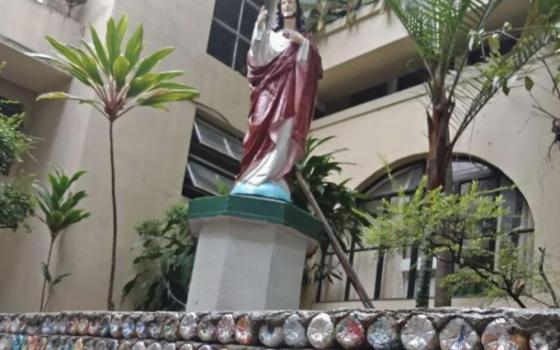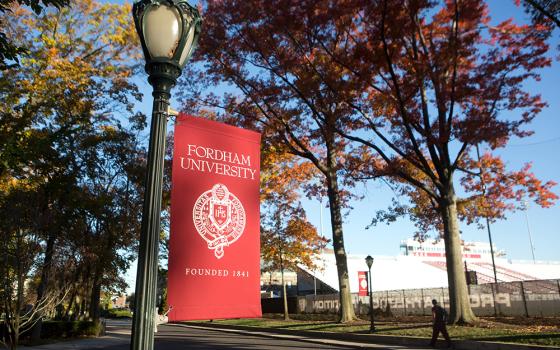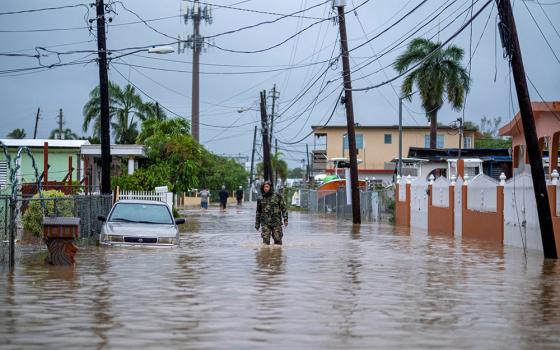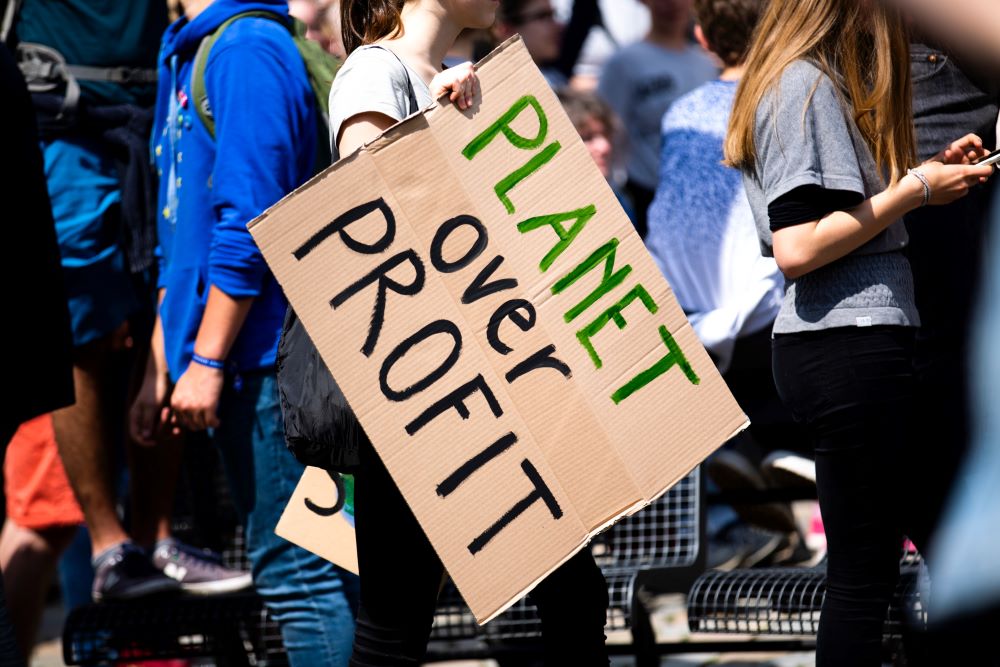
(Unsplash/Markus Spiske)
Editor's note: EarthBeat is publishing a series of essays on the goals of the Laudato Si' Action Platform from speakers at the 2023 "Laudato Si' and the U.S. Catholic Church" conference, held virtually throughout June and July and co-sponsored by Creighton University and Catholic Climate Covenant. This essay is on the Laudato Si' Goal "Ecological economics."
In order to grapple with ecological economics — one of the seven goals Catholics are called to embrace through the Laudato Si' Action Platform — each one of us should pay close attention to the core ideas underlying today's mainstream economics and whether they serve us in building a livable future for humanity and our community.
The narrow free-market frame that has dominated much of modern economics is rooted in a drive for endless economic growth. Given economic growth has delivered for an elite few — by 2021, the top 10% of U.S. households owned 70% of the country's wealth — many have begun to ask whether those fruits of growth are beginning to rot. This singular focus on growth has turned nature into a commodifiable asset.
As Pope Francis wrote in his 2015 encyclical "Laudato Si', on Care for Our Common Home," "A technological and economic development which does not leave in its wake a better world and an integrally higher quality of life cannot be considered progress. Frequently, in fact, people's quality of life actually diminishes — by the deterioration of the environment, the low quality of food or the depletion of resources — in the midst of economic growth."
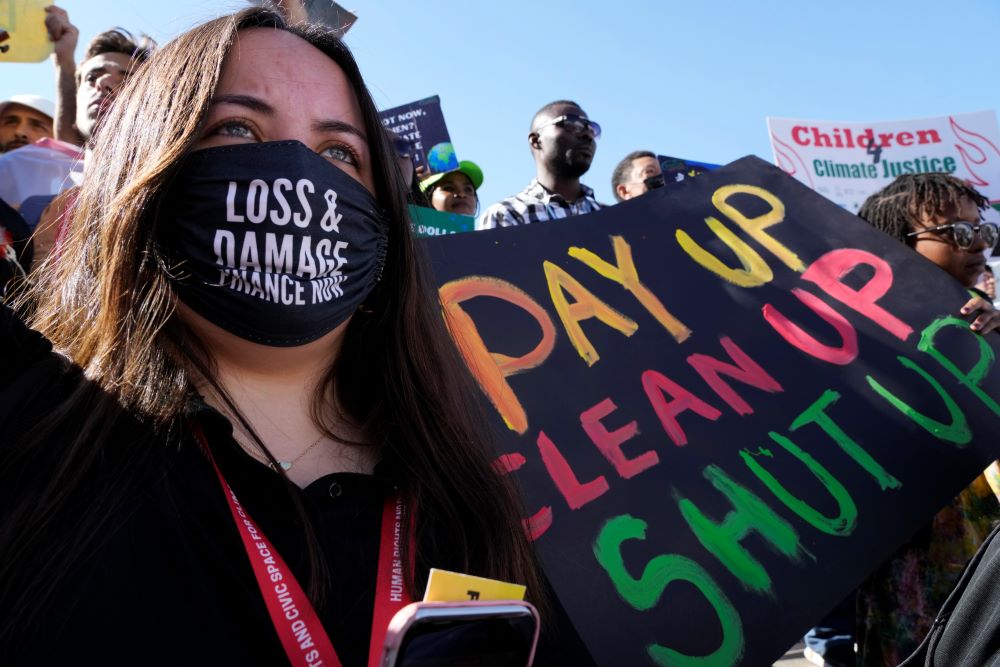
A demonstrator holds a sign that reads "pay up clean up shut up" during a protest at the COP27 U.N. Climate Summit Nov. 12 in Sharm el-Sheikh, Egypt. (AP/Peter Dejong)
Today's mainstream economics, through its emphasis on growth and efficiency, continues to legitimize rapid ecological change and resource extraction from communities, particularly those who are most vulnerable. By concentrating wealth and power in the hands of shareholder-owners, communities are not empowered to develop, resource and build their own vision for the future. Often, investments bring more benefit to investors than to the communities they supposedly support.
As Francis says in Laudato Si', these cries of the earth and of the poor go hand in hand. How are we to respond?
While the dominant paradigm has positioned an elite subset of the private sector as primary stewards of our economy, ecological economics recognizes that we are all responsible for the ways we live, how we provide for our needs, what we purchase, and how we manage our financial and other resources. More frameworks are emerging, like "doughnut economics," a 21st century idea first published in 2012 by Kate Raworth that says the purpose of our economy is to support human flourishing on a healthy planet.
The economy is one "ecology" among an array of different "ecologies" we encounter in our daily lives — like those touching the environmental, social, cultural and human realms. Laudato Si' calls upon us to consider how these ecologies are all connected with each other in order to form an integral ecology.
This is one of the beautiful features of ecological economics: it reminds us that if a community is aware of the interdependence of all its members, diversity will enrich the relationships and thus enrich the community.
Pope Francis calls us to see clearly that the realm of the economy — and economic growth — cannot be disconnected from the environment. We need to recognize that to talk about the vulnerability of our climate is also to talk about our own vulnerability and the vulnerability of the goods and services that make up our economy. By privileging unfettered consumption, profit maximization, short-term gains and individualism, our modern economy has thrown us into disequilibrium. We are left battling loneliness, epidemics in mental health and addiction, a lack of community, inequality and spiritual emptiness.
How do we shape and support the structures of an economy that fosters our flourishing? To build a different kind of economy, we need courageous animators of a new vision that can work at the service of our human and planetary flourishing.
I am encouraged by the groundswell of "new economy" movements everywhere I look. The Wellbeing Economy Alliance builds collaborations across governments and organizations to foster policies and norms that deliver human and ecological wellbeing. The New Economy Coalition organizes alliances of different actors working to transition us to a solidarity economy. These are movements giving visibility and collective voice to a network of cooperatives, social and solidarity economy expressions that incarnate the principles of ecological economics.
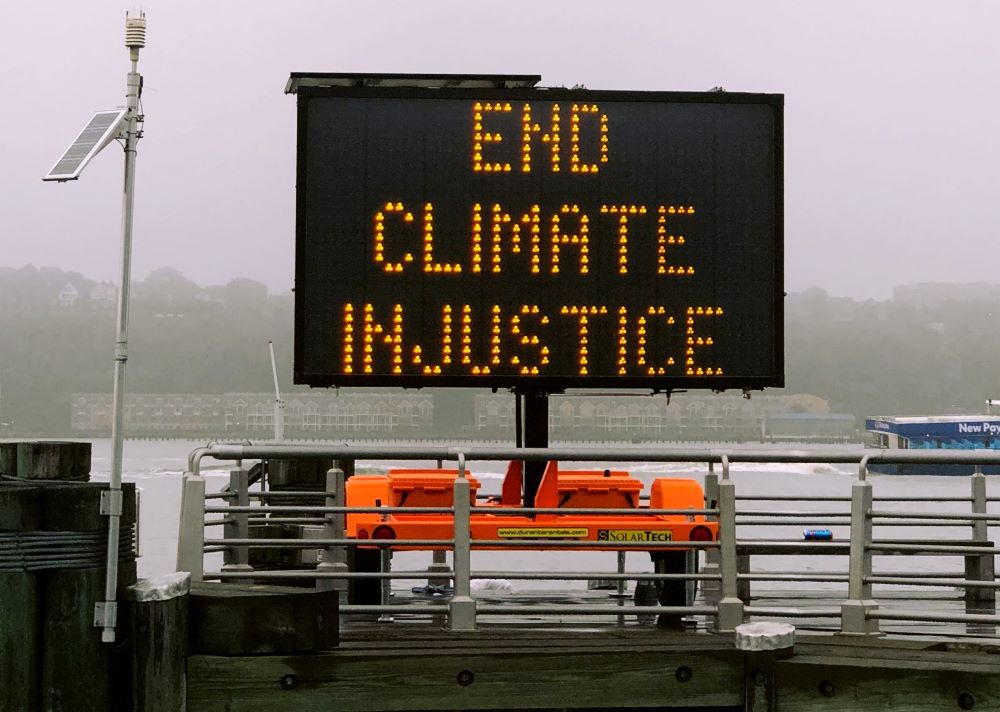
(Unsplash/Jon Tyson)
Take for example the Industrial Commons in Morganton, North Carolina, which is fostering a regional textile manufacturing ecosystem through an integrated network of employee-owned industrial cooperatives using circular manufacturing processes to reduce waste. Another expression of ecological economics is the Bronx Cooperative Development Initiative, which has created a network of community and labor organizations, anchor institutions and small businesses focusing on innovation in digital-fabrication technology.
These efforts avoid a narrow focus on economic rationality, which typically sidelines the need to transform power through expanding participation and agency. When we all see ourselves as agents — or in Pope Francis' words, "protagonists" — in transforming the economy, we can unleash our creativity and infuse the economy with the values of solidarity, the common good, care for one another and care for our common home.
This is hard to do without engaging in what Francis calls an "ecological conversion," essentially a "turning of the mind and heart" to let go of some of the ideas we've inherited or imbibed about the economy in order to transcend that which is not serving us, include that which deserves holding on to, and make room for what's emerging.
Advertisement
Many financial investors are undertaking this journey. Through the Francesco Collaborative's Livable Future Investing workshop, we invite Catholic groups and others who steward and invest financial resources to "see" the structural problems of the global economy and then to move financial resources into efforts that express a solidarity or ecological economy. This is critical work because our financial flows nourish the roots of our economy.
And it is hard work because we are so mired in the logic of profit maximization that it can be hard to ask ourselves, what is enough? We have been so steeped in a scarcity mindset and the story that we as individuals will make or break our fortunes that it can be hard to lean into the ideas of an ecological economy, let alone embrace them.
But asking ourselves these hard questions, in community with one another, rooted in the Catholic faith, is among the most important undertakings of our time. If we are to build a livable future, one where people and planet will flourish, we have to consider that Pope Francis' call in Laudato Si' to build an ecological economy is not for an elite private sector or government actors alone. It is for all of us.
How we manage our finances, how we provide for our needs and the needs of our loved ones, and how we weigh carefully the impact of our decisions on our communities and our common home — it all matters. It's about standing in solidarity with those building the structures of an ecological economy and listening deeply for the question we all need to ask ourselves: What's my most important work in building a livable future?





